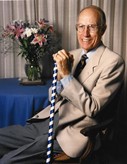
Robert V. Hine Jr.
Professor of History, Emeritus
Robert Van Norden Hine, Jr., Professor of History Emeritus at UC Riverside, died peacefully at his home in Irvine, California, on March 27, 2015, at the age of 93.
Prof. Hine was born in Los Angeles on April 21, 1921. He grew up in Beverly Hills, where his father was a real estate developer. When he was in high school, Prof. Hine developed severe juvenile rheumatoid arthritis. He was unable to attend high school for an entire year because his joints were so locked that he could not move. He nonetheless graduated from high school on time. He started college at the University of California, Los Angeles (UCLA), but withdrew after he began to have hemorrhages in both eyes. The hemorrhages were a result of uveitis caused by his rheumatoid arthritis. As he grew older, the uveitis made removal of his cataracts too risky and he slowly lost his vision.
After spending time in Colorado under the advice of a doctor who believed the altitude would help slow the progression of his vision loss, Prof. Hine earned a bachelor's degree in 1948 from Pomona College and a Ph.D. in history in 1952 from Yale University. In 1949, as a graduate student, he married Shirley McChord (1920–1996), whom he had met when they were students at UCLA. As his eyesight deteriorated, she became his reader and research assistant.
Prof. Hine specialized in California utopianism and the American West. His first book, California’s Utopian Colonies, was published in 1953. From 1954 to 1990, he was a faculty member of the Department of History at UCR. He served as Chair from 1962 until 1967. He was a Guggenheim Fellow for the academic years 1957–1958 and 1967–1968. Prof. Hine was recognized as the Academic Senate's Distinguished Teacher in 1968 and as the Senate's Faculty Research Lecturer in 1980.
In 1990, Prof. Hine retired with his wife to a retirement community in Irvine. The Department of History at the University of California, Irvine, gave him the title of Professor Recalled. During much of their academic life, Hine and his wife served as Danforth Associates, a national program injecting personal elements into education.
For fifteen years, from 1970 to 1986, Prof. Hine was totally blind, but actively continued his teaching and research. Prof. Hine put lecture notes in Braille on index cards he kept in his pocket and was so adept at fingering them that many students believed he had memorized his talks. For his large lecture classes, he made a seating chart in Braille that allowed him to call on individual students by name, as long as they sat in their assigned seats. He also kept his classes lively with a multimedia approach that was novel for the time. A friend with dramatic flair recorded quotations from Jedediah Smith, Black Elk and other historical figures that Hine combined with slides and music for a Ken Burns-like documentary approach to history. Hine was so skillful at assembling the presentations that a colleague dubbed him the “Cecil B. DeMille of our department.”
A high-risk surgery restored his sight in 1986, and he subsequently wrote a memoir, Second Sight, which was a first-hand account of his journey through blindness. Second Sight was a Book of the Month Club selection and a New York Times Notable Book of 1993. He published a second memoir about his experiences parenting a daughter with mental illness, Broken Glass: A Family's Journey through Mental Illness, in 2006.
When Prof. Hine first returned to the classroom after regaining his sight, the first thing he said to his students was, “You’ll never know how beautiful you are.”
His professional honors included two Guggenheim Fellowships, a National Endowment Senior Fellowship, the national Harbison Award for Distinguished Teaching, the California Historical Society's Henry Wagner Memorial Award, the Communal Studies Association's Distinguished Scholar Award, and the Western History Association's Award of Merit and Honorary Lifetime Membership.
His books include: California's Utopian Colonies (1953), continuously in print to this day; Edward Kern and American Expansion (1962); Bartlett's West: Drawing the Mexican Boundary (1968); The American West: An Interpretive History (1973, 2d ed. 1984); Community on the American Frontier: Separate but Not Alone (1980); California Utopianism: Contemplations of Eden (1981); In the Shadow of Frémont (1982); Josiah Royce: From Grass Valley to Harvard (1992); and The American West: A New Interpretive History (with John Mack Faragher, 2000). He also published two historical novels, Dynamite and Dreams (2008) and I Have Seen the Fire (2008).
He is survived by his daughter, Allison Hine-Estes, a grandson, Skye Estes, a brother, Richard B. Hine, and a sister, Katherine H. Shaha.
